The Lap Part 4: The tale of Jason Mitchell, the Pirate of Stanage Bay
After plumbing the depths of despair following a horror injury, Jason Mitchell returned to his Queensland fishing roots to find some peace and tranquillity.
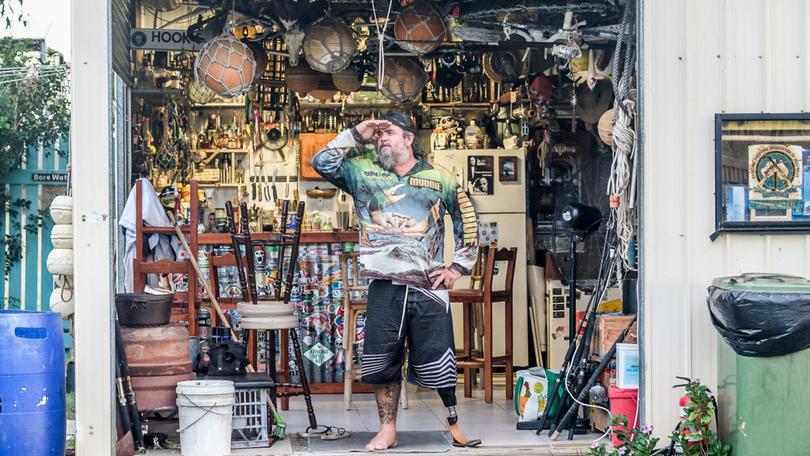
The 100km dirt road begins to wind and slow as the ocean comes into view. Fat cattle roam the surrounding hills, and down there, by the beach, is a rough old timber-and-tin homestead looking out to the Great Barrier Reef on the horizon.
The road stops in Stanage Bay, a hamlet of just 80 people, most of them professional crab and barramundi fishermen. There is just one shop here, the Plumtree Store: a combination of fuel station, supermarket and pub. Past the campgrounds, with all the caravanners and campers battling the sandflies and mosquitoes, you come to the boat ramp.
Jason Mitchell kicks his 16ft tinny up beside the pontoon walkway. Every kick makes a loud, metallic clang as his prosthetic leg thumps into the aluminium. He looks every bit the Pirate of Stanage Bay, as he is known. Salt-and-pepper ponytail, big bushy beard, gold earrings, and a tub full of mud crabs, the biggest the size of a bottle of Bundaberg rum. A cigarette dangles from the corner of his mouth. He curses the troublesome outboard motor, which has its cowling removed.
But beneath the gruff pirate exterior, there is a different man. There is a real man, a tender man whose surrender has allowed him to become strong in all the broken bits. Christ, it hasn’t been easy though. For years, Jason has struggled through pain and anguish and self-effacement just to get back here, to the life he knows and loves.
ROAM. Landing in your inbox weekly.
A digital-first travel magazine. Premium itineraries and adventures, practical information and exclusive offers for the discerning traveller.
By continuing you agree to our Terms and Privacy Policy.This life is all he has ever known. He grew up here, in a fishing hut on the beach, the eldest of three sons to a fisherman, Phillip. From school age he stayed with his mum, Tina, in Rockhampton, the closest regional centre, but his heart was always down the end of the dirt road at Stanage Bay.
“Really, mate, I only went to Rocky for school and to play junior footy on the weekends. We spent a lot of time at Stanage. We travelled the dirt road every weekend to see my father, who was fishing here and living in the huts,” he says.
“They were squatters huts, all set on the beach. It was our secondary home, but it was our primary home in our hearts. It was all generator power and rainwater tanks. You learnt to be conservative with water. There was an old thunderbox toilet out the back; we didn’t get septic until the late ’80s. It was pretty pioneering, pretty primitive living.
“Mud crabs and barramundi were our main source of income. If we weren’t helping the old man pull or set the nets we were on the the knives, filleting and trimming fish.”
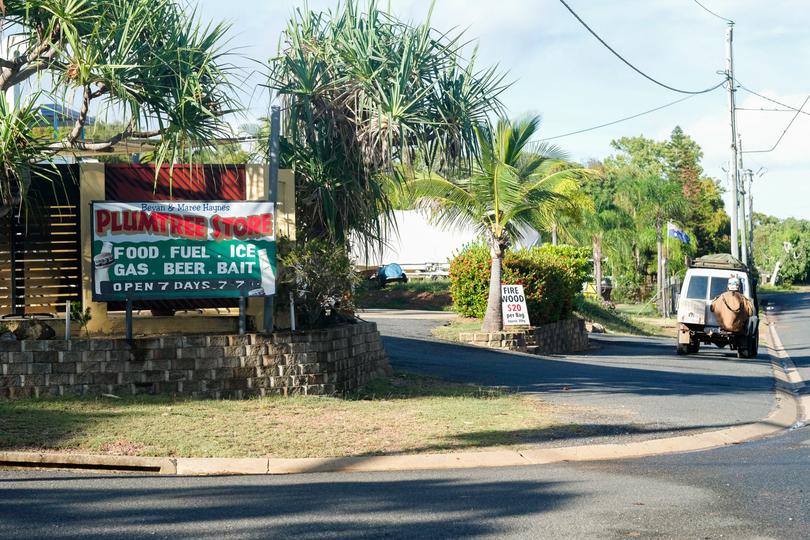
In 1987, Phillip and Tina loaded their three boys’ kids into a 60 Series LandCruiser, hitched on a caravan, and took off on The Lap. They settled in Perth, but after a year they heard news that the Queensland government was demolishing the fishing huts at Stanage. The owners were to be allotted new parcels of land through a ballot.
“We had to pull up stumps and hit the road, take the rest of Australia on and come home and deal with pulling down the hut, which had been in our family for a while,” Jason says.
“Everyone who had a hut got their name drawn from a ballot. It was only one name, it didn’t matter if there were several people involved, it could only be one. And they were given the option to purchase a block. Wherever your hut was, you should have had that pick first, but it was just luck of the draw.”
The Mitchell family lucked into a beachfront lot. Phillip lived in the caravan, fishing and building a lodging to cater for the increase in visitors the new municipal arrangement had brought. As soon as Jason finished his schooling, he came out to join his old man. In the balmier, autumn months they fished offshore, mostly around the Percy Islands, 40 nautical miles offshore.
The Percies have long been a place steeped in myth and story. Initially a bivouac for the local Darumbal people, who paddled bark canoes from the mainland, James Joss and Charles Mason were the first whitefellas to settle here. They came hunting for gold, and found what Matthew Flinders had earlier described as “one of the most beautiful places he had ever seen”. They built homes and reared goats and planted edible fruits to trade with passing mariners. In 1875, they were granted the first government lease for the island.
However, the Percies had a knack of sending men mad. After a few years, Mason went insane and died while Joss took to talking about the gold sovereigns he had hidden but could not remember where. They have remained elusive.
A series of eccentric caretakers followed: Captain John Till with his team of wives; former Ceylon tea trader John Armitage; self-exiled son of aristocrats and former Olympic athlete Andy Martin; and finally, the controversial Mick Cotter.
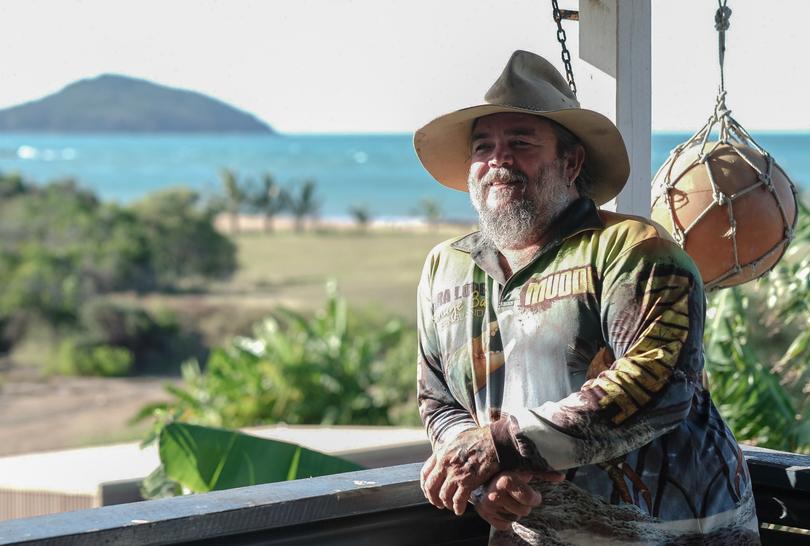
On fishing trips, Jay sometimes camped on the island with Mick. They became close over the years, and Jay eventually acquired a contract to run stores out to the island. In 2008, however, Cotter was booted off the island after the District Court found he had coerced the $320,000 lease from the ailing Martin for just $10. Cotter set sail for Thailand and began managing and refitting luxury yachts. In 2016, he employed Jay to document the refits and transport his high-end clientele.
“I love driving boats. Everybody knows I’ve hung onto a tiller arm for most of my bloody life. I think I’m shaped like an outboard operator. At least, one side of me is anyway. It’s a unique art form,” Jay says.
“Mick needed my help, mate, helping people to board these vessels. They were using what they call RIBs, rubber-inflatable boats, which is really just a dory to a fisherman like me. And he couldn’t find a better doryman than me.
“It’s a serious thing. Ferrying these dignitaries about in their fancy clothes, you don’t wanna get a drop of water on ‘em. And you have to pull up alongside these pontoons which are bobbing up and down in the waves, and help ‘em onboard.”
A crowd of people formed around me. Some were filming. There was a lot of blood, more blood than I ever want to see in my life again.
Jay spent three years in Thailand working with Mick. It was a real treat, ferrying movie stars about and working on multimillion-dollar vessels, but his heart was still down there at the end of that old dirt road. In 2019, he began making his way home. He headed via a mate’s wedding in Phuket, where he spent a couple of weeks perched up in rural digs beside a reggae bar.
He had a feeling something was wrong the night when he took off on his motorbike to grab a gas bottle for the homestay owner. He saw the police roadblock up ahead and figured he could just go around. He was tired of paying bribes. It didn’t matter if he wasn’t doing anything wrong; he was white, Australian, a walking dollar sign.
At first, the police moved to let him through. He accelerated, but then they started rushing at him, hands on their batons. He panicked and roared around; through the intersection, straight into a saleng motor cart which t-boned him into a parked car. He felt its mirror snap but somehow he was still riding. He knew if he stopped there would be a crowd of Thais demanding money, even if it wasn’t his fault. He kept riding.
“I felt this pain in my leg, and I looked down and just went, holy f..k. It had actually pushed the foot peg straight through my leg,” he says.
“I rode up ahead and jumped off the bike. I couldn’t stand. I just collapsed. A crowd of people formed around me. Some were filming. There was a lot of blood, more blood than I ever want to see in my life again. I had 20,000 baht on me, which is about $1000. They took that off me and started organising an ambulance, which was really just a van with an ambulance sticker on the side.
“In the hospital, they put me back together. There were two metatarsal bones and two tendons missing where the foot peg had gone through. They ran 13 wires up through my leg and just sewed me back up, brother. They kept me alive.”
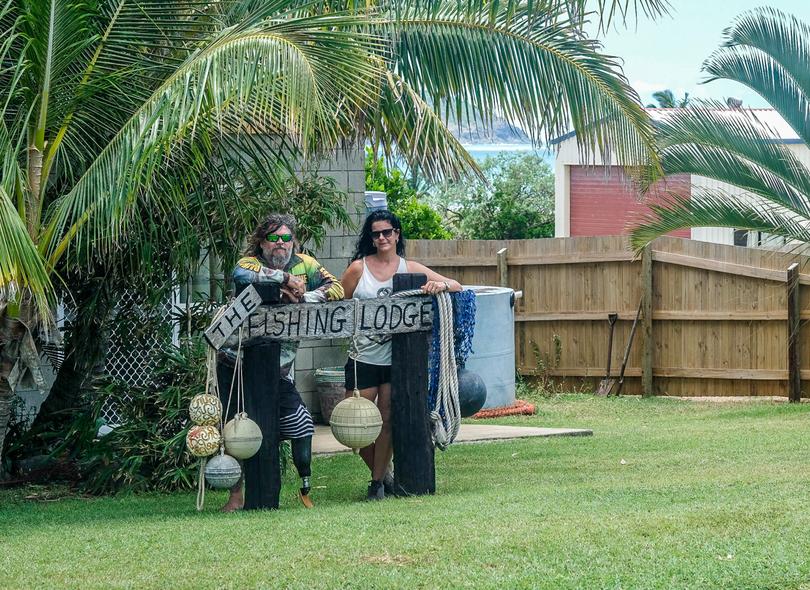
He stayed there in hospital for almost three weeks. He couldn’t leave until he paid, and it was costing him nearly $2000 per day. He was an expat had no medical insurance, and had to start a GoFundMe page to get home. Finally, after raising almost $40,000, he was on a business-class flight home.
“Tears came into my eyes when I come over the country. I was just glad to be home after all that I’ve been through,” he says.
“But when I got back to Brisbane, that was when the infection started kicking in.”
Jason lay in his Royal Brisbane hospital bed staring at the photo on the wall. He imagined himself there, blaring around that headland in the tinny, pulling up on the empty island beach and throwing out his swag. Diving into that crisp blue sheet of ocean, sand as fine and white as caster sugar between his toes.
He’d been staring at that photo for three weeks; a portal to a dream away from this hell in the infectious disease ward. Away from the searing pain in his mangled foot; the embarrassment of his kids being seen with a peg-leg Dad, the self-pity and shame for his partner, Petra.
“Just go, Pet,” he tells her.
“I’ve done this to myself. Just go. Leave me here in my misery.”
But Pet refuses to go. She stays here, standing with him, helping him to make sense of the constant stream of nurses and doctors, all trying to break it to him softly. First just a few toes, then above the ankle, and now below the knee.
I would be lying if I said it was nothing and I just got over it. The drugs they give you, it deals with the pain, it doesn’t deal with the mental thing.
“Where does it f..king stop?” he asks them. “Fix it. Just f..king fix my leg.”
But Jay knows deep down that this leg can’t be fixed. In that black, sinking reality of acceptance, that photo up there is the last hope he clings to. As the doctor walks into his hospital room, Jay points up to it.
“You see that, Doc?” he says. “You see it?
“If you cut it off, will I still be able to go back to that life?”
Two weeks after the amputation, the swelling had gone down enough for Jay to move to the rehabilitation clinic in Rockhampton. There, the staff fitted him with a prosthetic leg and began teaching him to walk again. They helped him hobble along the parallel bars, doing leg weights to get strength back, and using elastics to get some movement going. But the mental anguish was far more crippling than the physical injury.
“I just had this mentality, like, f..k this. I just want to go home. I hadn’t even been home yet. It was difficult, mate. And look, it hurt. Everything hurt,” Jason says.
“I would be lying if I said it was nothing and I just got over it. The drugs they give you, it deals with the pain, it doesn’t deal with the mental thing.
“But once I got my leg, I just went, that’s it. I’m putting it on. I was determined to walk out of there. I’m walking out, man. I realised it was all a mindset. It’s a mentality. The only thing to do was get up and have a go, and it works.”
Jay did walk out of that hospital, as he determined to. He grimaced through the pain, step by step, egged on by the cheering and hooting of the rehabilitation staff. He moved into a small unit in Rockhampton, prying himself off the couch and trying to keep the dark thoughts away by spending his days pruning the front hedge.
“You have your days where it’s all just too hard. I had to try to keep my mind busy in other ways. You can’t let yourself get to that stage,” he says.
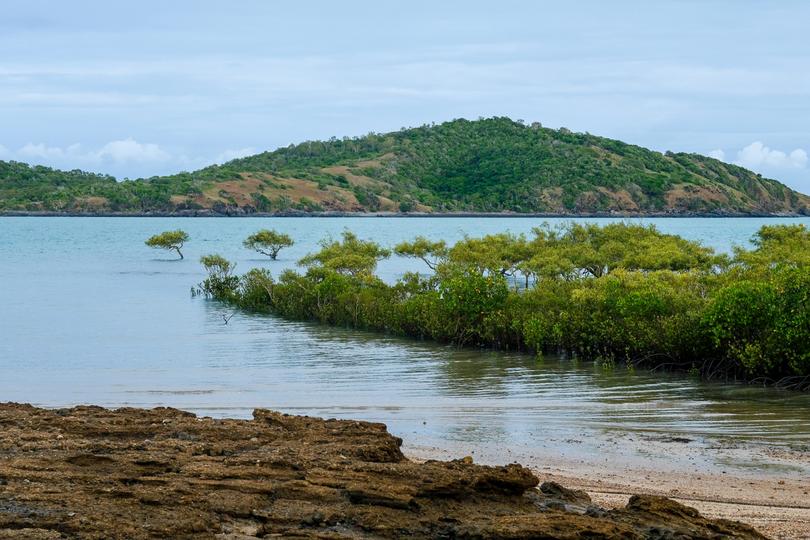
“It was just me and my milk crate, mate. I’d carry it around with me and a pair of snips, and I could only manage two or three steps. I would just sit down and do a bit of pruning.
“The more I went on, the more I realised that life is not f..ked, as I first thought. It’s only a little thing. It’s made me think about every step I take, and it’s a reminder to slow down. I’m nearly 50 and I’m still getting around like a 20-year-old. You think you’re young and tough, but trust me, it’s made me think about things a lot more.”
Not long after he learnt to walk again, Jay’s old schoolmates from Rockhampton took him out for a day on the tinny. They watched the dark, pained look on his face smooth over as they dropped a few crab pots into the Fitzroy River, and flicked lures at the mangroves. Soon enough, he was back working as a commercial crab fisherman, riding four-wheelers, going on trips out to the islands again.
But the pain and anguish of an injury like this never really go away. He still gets fed up with feeling like he’s a burden, dragging a leg around that feels like a concrete boot. He’s just learnt to accept it and appreciate the little victories; and as long as he can still roll his swag out on the beach, he has something to live for.
“Just getting out to the islands. It helps me 100 per cent. I love swimming. Just the clear water, and sand. It’s beautiful. If you’re feeling down in life, just get to a beautiful place. And we’re lucky enough that Australia is full of ’em.”
